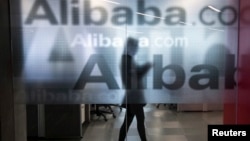U.S. investors are preparing for Chinese e-commerce giant Alibaba's market debut next month, when it is expected to begin trading on the New York Stock Exchange at a value of roughly $200 billion, potentially one of the largest initial public offerings, or IPOs, ever.
Slated to go public in early September, Alibaba may become one of the most valuable companies in the world, with a market capitalization of up to $250 billion, compared with other tech giants like Apple at $602 billion, Google at $400 billion and Microsoft at $374 billion.
The Alibaba Group reported a jump in second quarter earnings ahead of the IPO, with total revenue climbing 46 percent from year-ago levels to $2.54 billion.
Last year, Alibaba, which accounts for about 80 percent of all online commerce in China, handled more Internet transactions than U.S.-based Amazon and eBay combined, with more than 230 million active buyers, about 17 percent of China's population.
The privately owned Hangzhou-based group is one of China’s Big Three Internet companies — along with social media and video game behemoth Tencent and search engine giant Baidu.
“Online businesses tend to have not only economies of scale but network effects, where people want to use the same website everyone else is using – it makes business easier,” said Indiana University’s Scott Kennedy.
“Alibaba has an excellent business model and has done very well, while Tencent, Baidu and others dominate in their niches,” he said.
Alibaba is looking to sell a 12 percent stake in the IPO. As a result, the company could raise more than $20 billion and rank among the largest ever in the United States, Bloomberg reported.
By 2020, Alibaba’s online retail sales in China could reach $650 billion, as much as the United States, Japan, United Kingdom, Germany and France combined, according to the U.S. management consultancy McKinsey & Company.
China has become the world's second-largest e-tail market, with estimates as high as $210 billion for revenues in 2012 and a compound annual growth rate (year-over-year) of 120 percent since 2003.
It commands more than five percent of total retail sales worldwide, almost all on digital marketplaces.
China’s weak stock market
But despite China’s economic power, the country’s nascent stock market – created in the 1990s – has so far underwhelmed, according to Kennedy.
“Chinese companies have been trying to raise capital on stock markets for a long time [but] within China listing has been difficult and the market has not done very well,” said Kennedy, who runs Indiana University’s Research Center for Chinese Politics & Business.
“It’s ironic that a fast-growing Chinese economy has not supported a healthy stock market whereas a slower-growing U.S. economy has,” he said.
The U.S. and China have seen political tensions escalate of late over cyber-spying and security matters in the South China Sea, but that has not stopped the two economies from continuing to integrate.
Alibaba’s expected New York IPO should take that process to another level.
“Alibaba is a true-blue private firm started by Jack Ma, who originally was an English teacher. Really, it’s a Horatio Alger [rags to riches] story for China, something that a lot of Americans can identify with,” Kennedy said.
Mark Snowiss contributed to this report.




